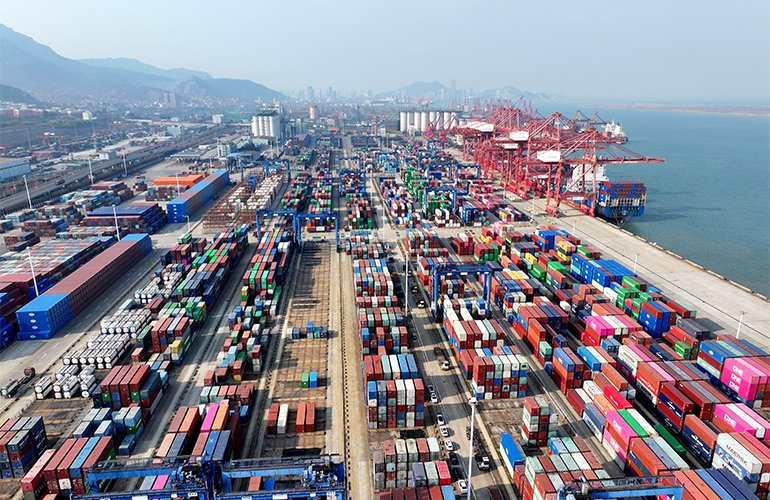 The Road to Global Cooperation Runs Through Regions
The Road to Global Cooperation Runs Through Regions(Yicai) Jan. 20 -- The world is undergoing geopolitical turbulence at the very moment multilateral approaches are needed to advance critical shared priorities. Temperatures reached record levels last year, economic growth is uncertain, and questions remain over how to unlock the benefits of frontier technologies while minimizing attendant risks—all while geopolitical competition and confrontation are escalating.
While cooperative approaches may seem out of reach in this challenging context, there remain important signs that collaboration is continuing, most notably at the regional level. Regional initiatives to strengthen economies, advance energy and climate, and to develop equitable digital ecosystems have all progressed recently and offer not just some good news, but can serve as possible models for how to advance global goals despite the headwinds.
On the economy, current economic projections show historically tepid prospects ahead, at 3.3% global growth over the coming five years, . One ingredient that can help boost both locally and globally is deeper integration at the regional level. Here, developments in Africa are showing how countries are working together to facilitate the flow of trade, capital and people. Formed in 2021, the African Continental Free Trade Area (AfCFTA) includes 54 of Africa’s 55 nations, covering a population of 1.4 billion people and a combined GDP of $3.4 trillion. The agreement is poised to integrate economies, increase exports by $560 billion, boost intra-Africa by 68% and external investment by 122%, and add 18 million new jobs across the continent by 2035—it is why the UN has it “a potential game-changer for promoting Africa’s inclusive growth and sustainable development”.
Though several hurdles remain ahead of full implementation, including the need to upgrade trade infrastructures and better facilitate currency conversions, last year important progress was made. In particular, the Guided Trade Initiative—an effort by the AfCTA Secretariat to facilitate the flow of goods at the intraregional level— to 39 countries and includes sub-Saharan Africa’s largest economies, South Africa and Nigeria.
On climate and energy, the world has just come off the hottest year on record, with accelerated action needed to stem even worse climate outcomes. Europe’s climate commitments are the world’s most ambitious ones, but recent analysis shows that the climate neutrality target for 2050 remains out of reach, primarily because of intra-EU complexity in areas such as energy and electricity markets, capital markets and, last but not least, a vastly fragmented regulatory landscape. Building on the European Green Deal that was launched in 2020, the upcoming Clean Industrial Deal is expected to offer an opportunity to align climate and industrial policies across the European Union. It to steer European industry towards cleaner production by bringing down energy prices while moving towards higher shares of clean and renewable energy sources. In addition to promoting intra-EU collaboration, including delivering an energy union in which investments into clean energy infrastructure and technologies are prioritized, a new form of partnership agreements will be leveraged to secure stable supplies of raw materials.
On technology, the world is on the verge of a new era, as frontier technologies are poised to add over USD4 trillion in to the global economy. Yet billions of people do not have access to the internet or have limited access, and true gains from new technology cannot be realized unless proper safeguards are put in place to minimize risks.
Here, the Association of Southeast Asian Nations (ASEAN) is offering an important example of how a regional approach can deliver on advancing global objectives around technology. ASEAN’s 10 members have laid out numerous policy measures and frameworks to promote digital trade and commerce, including the Masterplan on ASEAN Connectivity 2025 and the e-ASEAN Framework Agreement. These initiatives are removing obstacles to economic growth in this critical business segment, from ensuring there is a safe and trustworthy online environment that people are prepared to use, to within the region to help micro, small, and medium enterprises become involved in the digital economy.
But most importantly, negotiations over the are expected to conclude this year. This to empower businesses and accelerate growth in an open, accountable and equitable online environment.
These bright spots of cooperation across Africa, Europe and Asia show how regional approaches can deliver on global objectives at a time of geopolitical turbulence. They are working because they are mission-specific, tailored to advance progress on specific issues and constructed accordingly. As they yield results, they can create a virtuous cycle in which they serve as lighthouses to other regions.
Mirek Dušek is Managing Director at the World Economic Forum and head of the Global Programming Group and the Centre on Regions, Trade and Geopolitics.